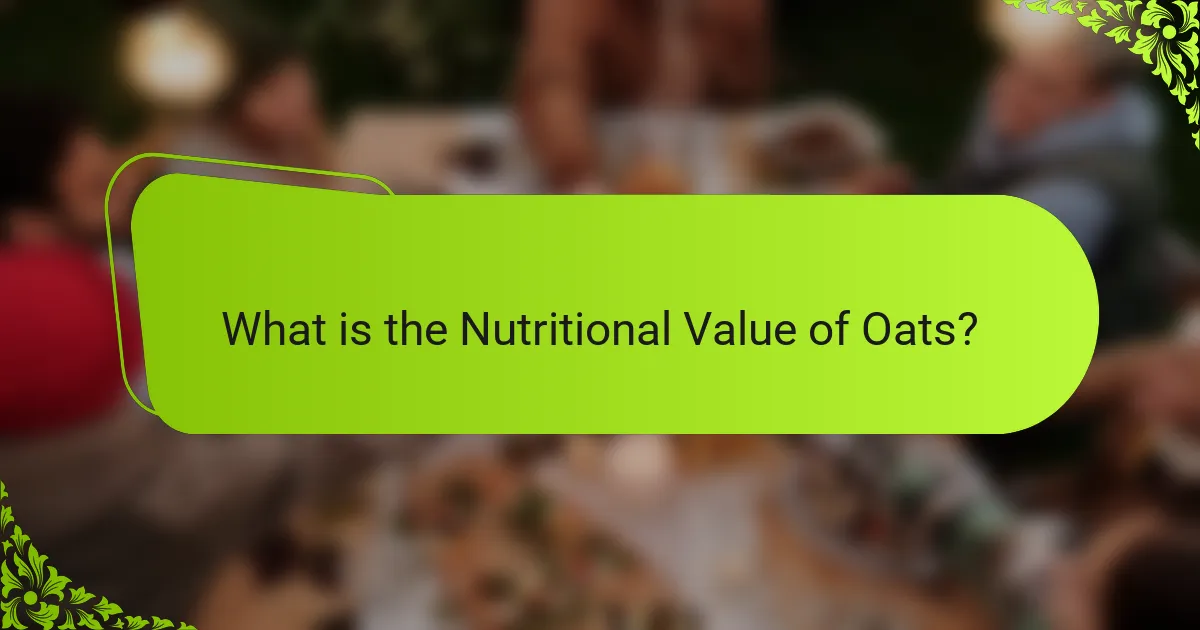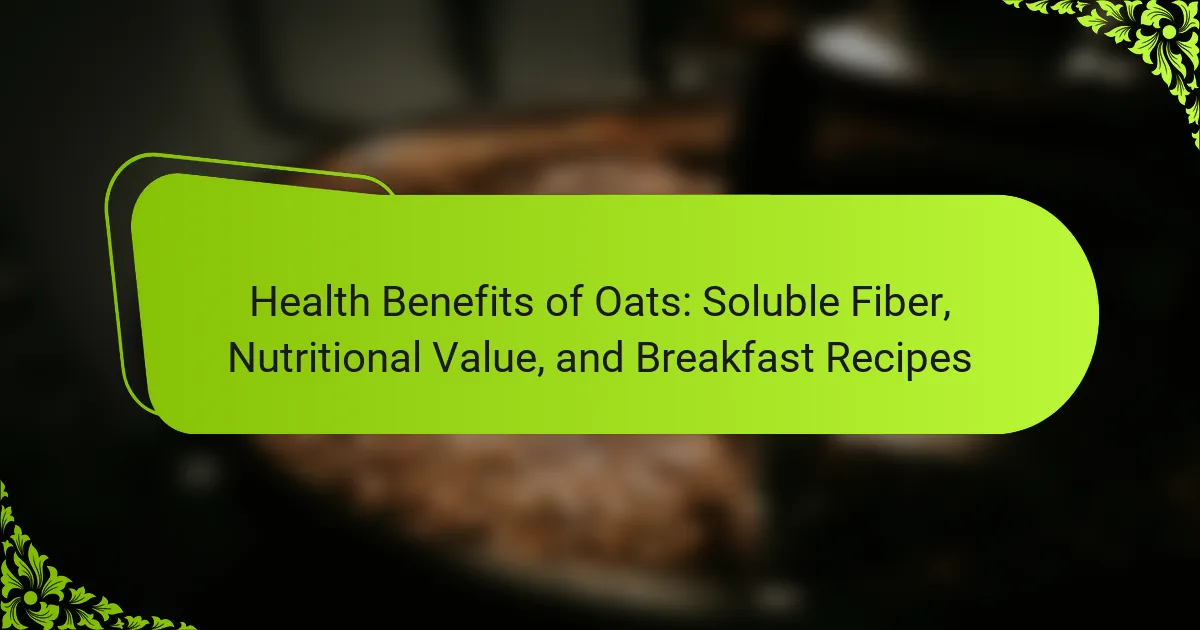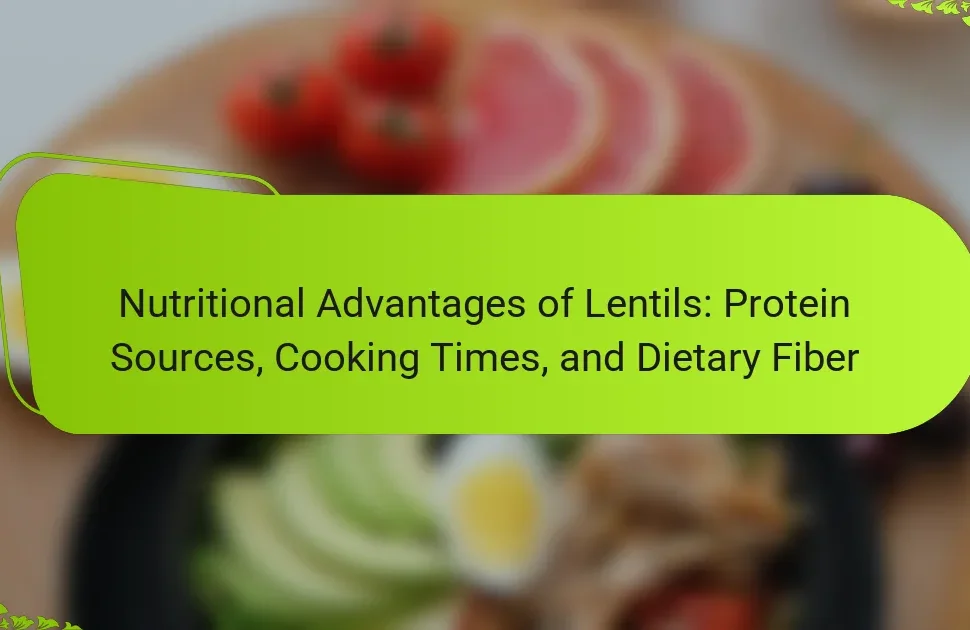
What are the Health Benefits of Oats?
Oats provide numerous health benefits, including improved heart health, better digestion, and weight management. They are rich in soluble fiber, specifically beta-glucan, which helps lower cholesterol levels. Studies show that consuming oats can reduce LDL cholesterol by 5-10%. Oats also promote healthy gut bacteria, enhancing digestive health. Additionally, they have a low glycemic index, which aids in blood sugar control. This makes oats beneficial for people with diabetes. Furthermore, oats are nutrient-dense, offering vitamins, minerals, and antioxidants. They can help in weight management by promoting satiety and reducing overall calorie intake.
How do oats contribute to overall health?
Oats contribute to overall health by providing essential nutrients and promoting various health benefits. They are rich in soluble fiber, particularly beta-glucan, which helps lower cholesterol levels. Studies show that consuming oats can reduce LDL cholesterol by 5-10%. Oats also support digestive health by promoting regular bowel movements due to their high fiber content. Additionally, they have a low glycemic index, which helps regulate blood sugar levels. Research indicates that oats can improve satiety, aiding in weight management. They are a good source of vitamins and minerals, including magnesium, iron, and B vitamins, which are vital for energy metabolism. Overall, oats are a nutritious food choice that supports heart health, digestive health, and weight management.
What specific nutrients are found in oats?
Oats contain several specific nutrients essential for health. They are rich in dietary fiber, particularly beta-glucan, which supports heart health. Oats also provide a good source of protein, containing about 13 grams per cup. Additionally, they are high in vitamins, including B vitamins such as thiamine, riboflavin, and niacin. Minerals found in oats include manganese, phosphorus, magnesium, and iron. Oats are also a source of antioxidants, specifically avenanthramides, which have anti-inflammatory properties. These nutrients contribute to the overall nutritional value of oats and support various health benefits.
How do oats support heart health?
Oats support heart health primarily through their high soluble fiber content. This soluble fiber, specifically beta-glucan, helps lower cholesterol levels. Lower cholesterol reduces the risk of heart disease. Studies show that consuming oats can lower total cholesterol by 5 to 10%. Additionally, oats improve blood vessel function. Improved function leads to better circulation and heart health. Oats also contain antioxidants, which protect the heart from damage. Regular oat consumption is linked to a reduced risk of cardiovascular disease.
Why is soluble fiber important in oats?
Soluble fiber in oats is important for promoting digestive health. It helps regulate blood sugar levels by slowing down glucose absorption. This can reduce the risk of type 2 diabetes. Soluble fiber also lowers cholesterol levels, which supports heart health. Studies show that consuming oats can decrease LDL cholesterol by 5-10%. Additionally, soluble fiber aids in weight management by increasing feelings of fullness. This can lead to reduced calorie intake. Overall, soluble fiber provides multiple health benefits that contribute to overall wellness.
What role does soluble fiber play in digestion?
Soluble fiber plays a crucial role in digestion by aiding in the formation of a gel-like substance in the gut. This gel slows down the digestion process, which helps regulate blood sugar levels. It also promotes the growth of beneficial gut bacteria. Research indicates that soluble fiber can improve overall gut health. Foods high in soluble fiber include oats, beans, and fruits. These foods contribute to a feeling of fullness, which can aid in weight management. Studies show that a diet rich in soluble fiber can reduce the risk of developing digestive disorders.
How does soluble fiber in oats affect cholesterol levels?
Soluble fiber in oats helps lower cholesterol levels. This type of fiber binds to cholesterol in the digestive system. It forms a gel-like substance that prevents cholesterol absorption. As a result, the body excretes more cholesterol. Studies show that consuming oats can reduce total cholesterol by 5 to 10 percent. The American Heart Association recommends oats for heart health. Eating just 3 grams of soluble fiber daily can significantly impact cholesterol levels. This benefit is primarily due to the beta-glucan found in oats.

What is the Nutritional Value of Oats?
Oats are a highly nutritious whole grain. A 100-gram serving of raw oats provides approximately 389 calories. It contains 16.9 grams of protein, 6.9 grams of fat, and 66.3 grams of carbohydrates. Oats also offer 10.6 grams of dietary fiber, which includes soluble fiber known as beta-glucan. This fiber contributes to heart health and helps regulate blood sugar levels. Additionally, oats are rich in vitamins and minerals. They contain B vitamins, iron, magnesium, and zinc. These nutrients support overall health and well-being.
What are the key nutritional components of oats?
Oats are rich in several key nutritional components. They contain a high level of soluble fiber, particularly beta-glucan. This fiber helps to lower cholesterol levels and improve heart health. Oats also provide a good source of protein, with approximately 13 grams per 100 grams. They are low in fat, with about 6.5 grams of fat per 100 grams. Additionally, oats are packed with essential vitamins and minerals, including manganese, phosphorus, magnesium, and iron. Their antioxidant properties are attributed to compounds like avenanthramides. These components contribute to the overall health benefits associated with oats, making them a nutritious choice for breakfast and beyond.
How many calories are in a serving of oats?
A serving of oats typically contains about 150 calories. This measurement is based on a standard serving size of 1 cup of cooked oats. The calorie content can vary slightly depending on the preparation method and any added ingredients. For instance, plain, cooked oats without added sugar or toppings maintain this calorie count. This nutritional information is supported by the USDA FoodData Central database, which provides comprehensive data on food items and their nutritional values.
What vitamins and minerals are present in oats?
Oats contain several important vitamins and minerals. They are a good source of manganese, phosphorus, magnesium, copper, iron, zinc, folate, and vitamin B1 (thiamine). Manganese is crucial for metabolism and antioxidant defenses. Phosphorus supports bone health and energy production. Magnesium aids in muscle and nerve function. Copper is essential for iron absorption and cardiovascular health. Iron is necessary for oxygen transport in the blood. Zinc plays a role in immune function and protein synthesis. Folate is important for DNA synthesis and cell division. Vitamin B1 supports energy metabolism. These nutrients contribute to the overall nutritional value of oats.
How do different types of oats compare nutritionally?
Rolled oats, steel-cut oats, and instant oats differ in their nutritional profiles. Rolled oats contain about 150 calories, 5 grams of protein, and 4 grams of fiber per 40-gram serving. Steel-cut oats have a similar calorie count but offer slightly more fiber, around 5 grams, due to their less processed nature. Instant oats are often lower in fiber, with about 3 grams per serving, but they are typically enriched with vitamins.
In terms of glycemic index, steel-cut oats have a lower score, promoting better blood sugar control. Rolled oats fall in the middle, while instant oats have a higher glycemic index, leading to quicker spikes in blood sugar.
Additionally, all types of oats are rich in beta-glucan, a soluble fiber linked to heart health benefits. They also provide essential minerals like iron and magnesium. Overall, while all oats offer health benefits, their processing affects their fiber content and glycemic response.
What are the differences between rolled oats, steel-cut oats, and instant oats?
Rolled oats, steel-cut oats, and instant oats differ in their processing and texture. Steel-cut oats are whole oat groats chopped into pieces. They have a chewy texture and take the longest to cook, usually around 20 to 30 minutes. Rolled oats are steamed and then flattened with large rollers. This process allows them to cook faster, typically in 5 to 10 minutes. Instant oats are pre-cooked and dried, making them the quickest option, often ready in just 1 to 2 minutes. Each type retains the nutritional benefits of oats, including soluble fiber, but the texture and cooking time vary significantly.
Which type of oats offers the most health benefits?
Steel-cut oats offer the most health benefits. They are minimally processed and retain more nutrients compared to instant or rolled oats. Steel-cut oats have a lower glycemic index, which helps regulate blood sugar levels. They are also high in soluble fiber, promoting heart health and aiding digestion. A study published in the Journal of Nutrition highlights the benefits of whole grain oats, including cholesterol reduction and improved satiety. This makes steel-cut oats a nutritious choice for breakfast.

What are Some Delicious Breakfast Recipes Using Oats?
Overnight oats, oatmeal pancakes, and baked oatmeal are delicious breakfast recipes using oats. Overnight oats are made by soaking rolled oats in milk or yogurt overnight. This method allows the oats to absorb the liquid and soften. Oatmeal pancakes combine oats with eggs, milk, and baking powder for a nutritious twist on traditional pancakes. Baked oatmeal is prepared by mixing oats with milk, eggs, and fruits, then baking until firm. Each recipe highlights the versatility of oats as a healthy breakfast option. Oats are high in soluble fiber, which can help lower cholesterol levels. Studies show that oats can contribute to improved heart health.
How can oats be incorporated into breakfast meals?
Oats can be incorporated into breakfast meals in various ways. One common method is making oatmeal by cooking oats with water or milk. This creates a warm, hearty dish that can be topped with fruits, nuts, or sweeteners. Another option is to add oats to smoothies for added texture and fiber. Oats can also be used in overnight oats, where they soak in milk or yogurt overnight with fruits and spices. Additionally, oats can be included in baked goods like muffins or pancakes. These preparations leverage oats’ nutritional value, providing fiber and essential nutrients. Studies show that oats can help lower cholesterol and improve heart health due to their soluble fiber content.
What are some easy overnight oat recipes?
Overnight oats are a simple and nutritious breakfast option. One easy recipe combines rolled oats, milk, yogurt, and chia seeds. Mix one cup of rolled oats with one cup of milk and half a cup of yogurt. Add two tablespoons of chia seeds and stir well. For flavor, include honey or maple syrup, and top with fresh fruits like bananas or berries.
Another recipe uses almond milk, peanut butter, and banana. Combine one cup of rolled oats with one cup of almond milk. Stir in two tablespoons of peanut butter and one sliced banana. Let the mixture sit overnight in the refrigerator.
A third option features cocoa powder and coconut. Mix one cup of rolled oats with one cup of coconut milk. Add two tablespoons of cocoa powder and sweeten with honey. Top with shredded coconut before serving.
These recipes are customizable and can be prepared in just a few minutes. They provide a convenient way to enjoy oats’ health benefits, including high fiber content.
How can oats be used in smoothies and baked goods?
Oats can be used in smoothies and baked goods as a nutritious ingredient. In smoothies, oats add creaminess and thickness. They also provide soluble fiber, which aids digestion. Typically, rolled oats or quick oats are blended into smoothies. This method retains their nutritional value while enhancing texture.
In baked goods, oats can be incorporated in various forms. Whole oats can add a chewy texture to cookies and muffins. Oat flour is often used as a gluten-free alternative to wheat flour. This substitution maintains the structure of baked items while increasing fiber content.
Studies show that oats can lower cholesterol levels and improve heart health. The soluble fiber in oats helps regulate blood sugar levels. This makes oats a healthy addition to both smoothies and baked goods.
What are the best practices for cooking oats?
The best practices for cooking oats include using the right ratio of oats to water. Typically, a ratio of 1 cup of oats to 2 cups of water is recommended. Cooking oats on a stovetop allows for better control over texture. Bring the water to a boil before adding oats for optimal cooking. Stirring occasionally prevents sticking and ensures even cooking. Cooking time varies; rolled oats take about 5-10 minutes, while steel-cut oats require 20-30 minutes. Adding a pinch of salt enhances flavor without overpowering the oats. For creaminess, consider adding milk or a dairy alternative during cooking. Allowing oats to rest after cooking improves texture and flavor absorption.
How can you enhance the flavor of oats with toppings?
You can enhance the flavor of oats with various toppings. Adding fresh fruits like bananas or berries provides natural sweetness. Nuts and seeds add crunch and healthy fats. Honey or maple syrup can offer additional sweetness. Spices like cinnamon or nutmeg enhance the overall flavor profile. Yogurt can add creaminess and tang. Dark chocolate or cocoa powder can introduce a rich taste. Nut butters provide a savory element and protein boost. These toppings not only improve flavor but also increase nutritional value.
What are common mistakes to avoid when preparing oats?
Common mistakes to avoid when preparing oats include using too much water, which can lead to a watery texture. Not allowing oats to soak can result in a chewy consistency. Overcooking oats can make them mushy and unappetizing. Skipping seasoning leads to bland flavor. Using instant oats instead of rolled or steel-cut oats can reduce nutritional benefits. Neglecting to stir while cooking can cause sticking to the pot. Not incorporating toppings can limit the dish’s nutritional value. Finally, ignoring portion sizes may lead to excessive calorie intake.
The main entity of this article is oats, highlighting their health benefits, nutritional value, and versatile breakfast recipes. Oats are rich in soluble fiber, particularly beta-glucan, which supports heart health by lowering cholesterol levels and aiding digestion. The article details the specific nutrients found in oats, including vitamins and minerals, and compares different types of oats in terms of their nutritional profiles. Additionally, it provides practical breakfast recipes and cooking tips to incorporate oats into daily meals, emphasizing their role in promoting overall health and well-being.




